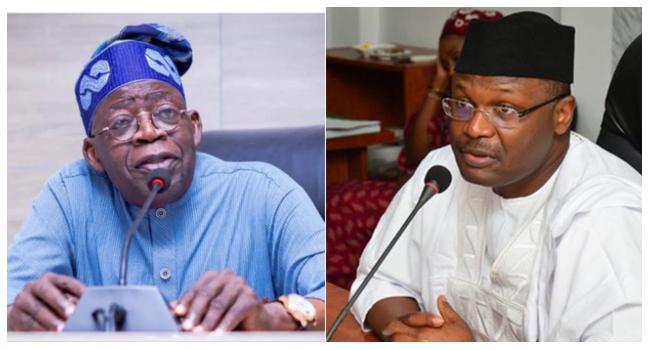
Samuel Omang
There are strong indications that President Bola Ahmed Tinubu will announce a new Chairman of the Independent National Electoral Commission (INEC) this week following the exit of Professor Mahmood Yakubu, whose second and final tenure ended on Tuesday after a decade in office.
Presidency sources revealed that Tinubu is expected to unveil his nominee after the Council of State meeting slated for Thursday, where discussions will centre on INEC’s leadership transition and preparations for the 2027 general elections.
In the interim, May Agbamuche-Mbu, a senior national commissioner and accomplished lawyer, has assumed office as acting INEC chairman, following a directive from the President in line with constitutional provisions governing succession within the Commission.
To honour his service, President Tinubu conferred the national honour of Commander of the Order of the Niger (CON) on Professor Yakubu, describing him as a “steadfast defender of Nigeria’s democratic process and a reformist whose contributions will shape future elections.”
“President Tinubu appreciates Professor Yakubu for his dedication to ensuring credible and transparent elections throughout his two-term tenure,” said Bayo Onanuga, the Special Adviser to the President on Information and Strategy.
Yakubu, in his farewell letter dated October 3, 2025, expressed gratitude to the President and Nigerians for the opportunity to serve, noting that his stewardship was defined by “innovation, resilience, and commitment to transparency.”
Appointed in 2015 and reappointed in 2020, Yakubu oversaw two general elections — 2019 and 2023 — and championed key electoral innovations, including the Bimodal Voter Accreditation System (BVAS) and the INEC Results Viewing Portal (IReV).
His tenure also saw the expansion of polling units across the country and the institutionalisation of Continuous Voter Registration (CVR). Yet, the 2023 general elections drew widespread criticism over technical glitches, logistical lapses, and delayed result uploads, triggering calls for deeper reforms and improved transparency mechanisms.
Handing over to Agbamuche-Mbu at the Commission’s headquarters, Yakubu stated that his resignation complied with Section 306 (1) and (2) of the 1999 Constitution (as amended), and emphasised that Nigeria’s democracy had made significant strides despite challenges.
“It has been my honour to serve Nigeria. Election management in Africa’s largest democracy is never easy, but we have made steady progress and laid foundations for stronger institutions,” he said.
The anticipated appointment has renewed debate among constitutional lawyers and political analysts over whether the President should retain the power to appoint the INEC chairman. While some, including Ifedayo Adedipe, SAN, argue that institutional strength matters more than the appointing authority, others such as Wale Balogun, SAN, insist on the need for a more transparent and competitive process to prevent political interference.
Sources within INEC disclosed that preparations for the 2027 general elections and upcoming off-cycle governorship polls in Anambra and Ondo States have already commenced. Yakubu, in his parting remarks, urged his successor to strengthen the Commission’s digital systems and ensure continuous improvements in election management.
Meanwhile, the National Assembly has pledged to fast-track the Electoral Act Amendment Bill, with Speaker Tajudeen Abbas confirming that new legal provisions will address electronic transmission of results, violence prevention, and dispute resolution timelines ahead of 2027.
